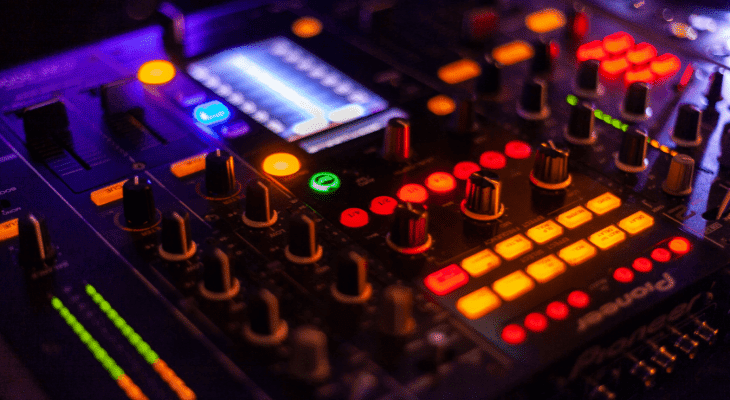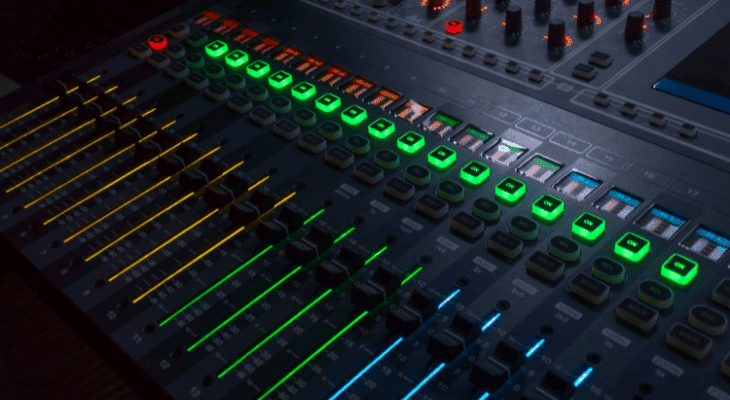If you’re interested in recording or live performances, a mixer is probably the number one item on your wishlist. Mixers are extremely handy – they can make your audio output clear, seamless, and customized. That said, these consoles do usually come at a high price – but ultimately, the cost is worth it.
Here are 8 reasons why audio mixers are so expensive:
- High-quality mixers are more costly.
- Expensive mixers reduce distortion and noise.
- Mixers are precision instruments.
- Mixers are complicated pieces of equipment.
- High-quality mixers reduce latency.
- Mixers are constantly evolving.
- Studio mixers are huge.
- Mixers are reliable.
So, let’s look at the details and discuss the features that can make an audio mixer so expensive. I’ll let you know about the intricacies of mixers and talk about how they are made to help you understand why paying as much as you do for a mixer is completely worth it.

1. High-Quality Mixers Are More Costly
Not all audio mixers are expensive, but the best ones are.
You can find low-grade third-party mixers available for incredibly low costs – finding lower quality options for under $100 is pretty easy. However, the tradeoff is that you’ll also be getting a piece of inferior quality equipment with fewer features.
The components that make up an audio mixer are usually expensive, and when you try to cut the cost of these components, sound quality also decreases.
Underneath their casings, mixers are made of thousands of small pieces of mechanical equipment, wires, solder, and large circuit boards. These components can be made from durable, high-quality metals and plastics, or they could be made from cheaper materials with less resilience and reliability.
When it comes to sound quality, having strong connections, the proper gauge of wire, and the correct insulation in your audio mixer can make a huge difference.
When you use cheaper, low-quality wiring and parts, your mixer won’t conduct sound as well. This quality reduction often results in skips, high noise floors, and annoying distortions that you can’t do anything about.
A low-quality console will probably be fine for amateurs and people who want to learn about what an audio mixer does. However, you should know that you shouldn’t expect clear, high-quality audio from a cheap mixer.
That said, if you’re passionate about producing high-quality audio or plan to use the mixer for live performances and recording, you should probably save up for an audio mixer made with durable and reliable hardware that’ll improve the sound of your audio input.
2. Expensive Mixers Reduce Distortion and Noise
Tools like USB sound cards and cheap, mass-produced mixers are incredibly affordable, and many people opt for these budget tools instead of purchasing a high-quality mixing console.
However, you’ll likely be able to hear the difference between these devices and a quality audio mixer, no matter whether you’re a professional producer or amateur recorder.
Quality audio mixers allow you to adjust the gain, compression, and tone of multiple audio inputs, ensuring that all sounds mesh well together.
Cheaper mixers and USB sound cards usually do this job inefficiently, while high-quality mixers can make an audio track sound much more seamless and clear.
During construction, all the channels inside a mixer have to be spaced out efficiently to minimize interference, lower noise floors, and increase your dynamic range. When the components inside are appropriately arranged, you can ensure that you won’t get any distortion from your sound.
However, cheaper audio mixers usually have noticeable distortion and interference since they’re generally designed to use as few materials as possible in as small a space as possible. Cheap mixers are also made from more affordable parts that don’t conduct sound as well, decreasing the sound quality and the durability of the console.
So, the low-cost parts inside a cheaper mixer are usually inefficiently spaced out, resulting in fuzzy, sometimes crunchy sound quality.
Go with a reliable mixer if you want your audio to sound precise and noiseless – the cost is worth it.
3. Mixers Are Precision Instruments
Making an audio mixer is no piece of cake, and it takes tons of time for just one mixer to make it from parts to a product on an assembly floor.
Because audio mixers are conductors that channel sound through a circuit, any slight inconsistency in construction could make the mixer ineffective, producing bad-quality sound.
Since each high-quality mixer is usually hand-assembled to ensure that each component is soldered and placed correctly, each one is a bit different. Testing is a crucial step in the manufacturing process since it can ensure that all of the mixers produced by a company meet the brand’s high standards.
This precision assembly and testing takes time, which is why audio mixers are usually made in small batches – which, in turn, drives up prices.
On the other hand, cheaper audio mixers usually go through less testing. Parts are often machine-installed, which means that the products will likely have inconsistencies. So, when you buy a mass-produced mixer, you never really know what you’re getting.
4. Mixers Are Complicated Pieces of Equipment
If you’re reading this article, you probably have a computer and know how much that computer costs. When it comes to price and construction, audio mixers are comparable to computers, as they both have complicated hardware that requires careful assembly by an expert.
In the case of digital mixers, they also have a built-in computer pre-programmed with software and presets, which can make them even more expensive than an advanced computer.
The hardware inside an audio mixer is usually made up of a vast (and typically expensive) circuit board with tons of potentiometers, capacitors, and transistors. These components have to be hand-installed and soldered onto the circuit board, making the construction process both time-consuming and labor-intensive.
Production times can be slow since it takes tons of labor and many parts to construct a single console. So, when you pay for an audio mixer, you pay for the work of every person who put effort into building the console.
More advanced expensive mixers usually have higher-quality parts made from rarer materials that can be more difficult to work with. However, these materials can make a huge difference in your sound quality, which is why they’re usually both more desirable and more costly.
In addition, expensive audio mixers spend more time on the assembly floor. That means that they usually have more reliable construction since durable construction can take considerable time and effort from manufacturers.
All that to say, a more expensive mixer will usually last longer than a cheap one because of its costly parts and careful construction.
So, realistically, a personal mixer should cost about as much as a computer does unless the mixer has cutting-edge special features and tons of channels. If it does have these additional capabilities, you should expect it to cost about as much as a high-end gaming computer or potentially more if you’re looking at a bench mixer.
5. High-Quality Mixers Reduce Latency
When performing live or recording for a music video, you want your timing to be in sync with each instrument and mic plugged into your mixer.
Anytime you convert analog sound to digital or vice versa, you can expect some latency in your sound. This latency is primarily unavoidable, but audio mixers can cut down this lag to the point where it’s hardly noticeable.
If you are mixing with a cheap mixer or skipping the mixing phase altogether, you can expect a bit of a lag as the signal is converted from analog to digital or from digital to analog.
This conversion takes more time if your equipment has to reroute the sound down many different channels to get to a speaker or recording device. However, mixers give your audio input a direct, short line to follow, making feedback sound much more natural. High-quality mixers reduce latency as much as possible, which is why investing in higher-end devices produces better results.
Mixers can ensure that each input is in-time down to the millisecond (usually around five milliseconds), eliminating the need for after-editing and re-recording, making production more effortless than ever.
Because audio mixers reduce latency, they’re also ideal for live performances since they can keep everyone in time, even when you have to channel your music through a PA system.
So, ultimately, investing in a mixer instead of another piece of equipment like a cheaper sound card or interface will result in much faster-moving, accurate audio recordings.
6. Mixers Are Constantly Evolving
We live in an era where technological innovation is constant, and when it comes to mixers, newer is usually better, albeit more unique mixers are generally more costly.
That’s because, generally, the more expensive an audio mixer is, the more features it has.
Like the new generations of phone models, TVs, and cars that continually come out every year, brand-new mixers come with features that make them more user-friendly, increase the quality of your audio, and allow you to customize your sound.
These innovations usually cost extra money since you’re paying for the newest designs made with brand-new assembly techniques, complicated layouts, and brand-new parts that can’t be found anywhere else on the market.
For example, one recent innovation in the mixer industry is special sound effects on analog mixers. These effects can be limited, with the higher limit usually around ten different settings. However, this feature is handy since editing a track after being mixed with analog can introduce unwanted distortion.
Additionally, digital mixers have cutting-edge features such as remote control from a smartphone, computer, or tablet. These features make live performances and personal recording much simpler. You can also use presets and loops on a digital mixer without pedals or other equipment, making your mixer all you need to record or perform a track.
Audio mixers can also broadcast audio to a headset or earpiece and provide phantom power to mics, which is exceptionally convenient for live performances. However, the more features a mixer has, the more it costs – which is why the best mixers are so expensive.
So, when you pay for a more expensive mixer, you’ll usually get some extra benefits that could replace the need for other pieces of equipment, saving you more money in the long run.

7. Studio Mixers Are Huge
If you’ve ever checked out the gigantic bench audio mixers made for use in a recording studio, you’ve probably noted that the prices are upwards of $20,000 for new desks.
These prices can get even bigger quickly. For example, the most expensive desk in the world, which Studio 2 used to record top albums from artists such as Pink Floyd, The Beatles, and The Cure, sold in 2017 for $1.8 million.
Although you shouldn’t expect to spend so much money on an audio mixer for your home studio, these top-of-the-line consoles indicate the kinds of mixers that celebrities and high-brow recording labels use to produce best-selling albums.
These desks are enormous, and that gigantic construction likely took many months to design, get the parts for, and assemble.
Just constructing these studio-quality bench mixers is a considerable investment, with labor, assembly, and testing costs considered. So, when you purchase one, you’ll have to pay for all of the money the manufacturer spent to build it, plus a bit more for shipping, branding, and company profit.
If you take the top off of a desk audio mixer, you’ll notice a circuit board covering every inch of the casing underneath. These boards are expensive in themselves, and the many different soldered-on components aren’t too cheap either.
So, the bigger your mixer is and the more channels and features it has, the more expensive it’ll be.
8. Mixers Are Reliable
Audio mixers are a significant investment, but ultimately, they should only be a one-time expense. High-end mixers can last years – the most expensive desk discussed above has been going strong despite over 50 years of hard use in recording studios.
It’s true that that specific mixer has been souped-up to the nines, which explains its longevity – but you can still expect an expensive audio mixer made by a reputable manufacturer to last you for more than 20 years (as long as you take good care of it).
Extremely expensive audio mixers can last a lifetime, especially analog consoles, which don’t have computers inside of them. So, the more you pay now, the less you’ll have to pay for replacements later, which could save you money in the long run if you like to always have a mixer in your repertoire.
Sources
- The Conversation: Pink Floyd’s $1.8m desk shows timeless appeal of analogue sound
- KBonet: 10 Best Audio Mixers To Buy In 2021 (With Buying Guide)
- DIY Audio: Best wire/cable to use for audio circuits?
- Gearspace: Why are professional mixing consoles so expensive?
- Instructables Circuits: Making an Audio Mixer
- Sound on Sound: Living With Latency
- Practical Music Production: What Audio Latency Is And How To Reduce It.
Recent Posts
QuickTime is a vital app for many Mac users, and if you’ve recently bought a new microphone, you might wonder how to use it optimally. QuickTime cannot record audio content if it doesn’t have...
Every microphone leaves a unique signature on the quality of its output. If you’re a podcaster trying to melt your way into your audience’s hearts, a muddy, distorted recording won’t cut it....
